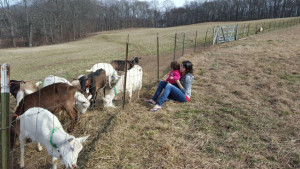I’m passionate about food safety because real people – folks who are just like my family, my neighbors or the guys on my hockey team – get sick every day.
Amanda Collins is a real person. NBC Connecticut reports that Amanda and her daughter are two of at least 15 people are ill with pathogenic E. coli after visiting a Connecticut goat farm.
“I walked right in,” Collins said. “Me loving farms, I held the goats, pet the goats and brought my daughter into the stall.”
Collins said it was a wonderful experience, with a knowledgeable staff and plenty of children and their parents around petting the goats.
However, a few days after the visit, the symptoms started. At first, she thought she had a stomach bug, but when her daughter developed the same symptoms, she knew something was wrong.
“Friday is when it hit, when I ended up having inestinal pain, diarrhea, seeing bloody stool,” Collins said. “And just seeing her go through the same thing that I physically felt myself is agnozing.“
After trips to the doctor’s office and the emergency room, both she and her daughter tested positive for E.coli. She did not put all of the pieces together until she got a call from the CDC.
“That’s when it clicked and I was like I did visit a farm and I had a lot of interaction with the animals,” Collins said.
“I cried a lot,” Collins said. “I was very anxious. I was upset about it at first, but never angry at the farm though.”
Collins said both she and her daughter used hand sanitizer at the farm and wet wipes once they got to the car. She said this will not stop them from visiting farms in the future.
“The only thing I would have to said is please build a facility where people where people can wash their hands because I think that will stop a lot from spreading.” Collins said.
Reducing risk in animal contact settings is more than just handwashing. Soil, sawdust, rails and food are all vectors.
Click here for a table summarizing petting zoo and animal contact outbreaks over the past 25 years.
